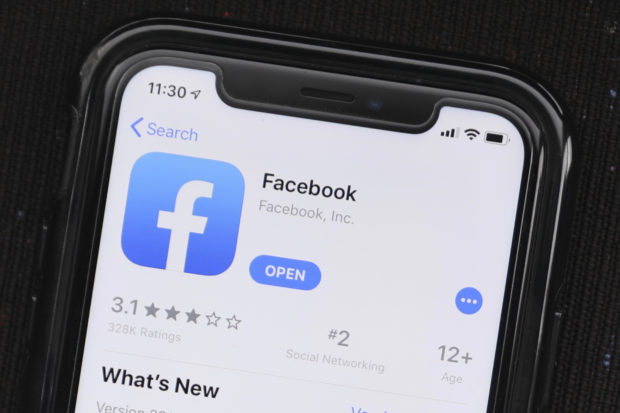Advocates fault Facebook over misleading posts by politicos
ATLANTA – Advocacy groups at a meeting with Facebook on Thursday criticized the tech giant’s announcement earlier this week that it won’t remove newsworthy posts from politicians even if they’re misleading or break the site’s rules.

FILE – In this July 30, 2019, file photo, the social media application, Facebook is displayed on Apple’s App Store. Advocacy groups at a meeting with Facebook are criticizing the tech giant’s announcement earlier this week that it won’t remove newsworthy posts from politicians even if they’re misleading or break the site’s rules. (AP Photo/Amr Alfiky)
Facebook and civil rights group Color of Change hosted a meeting Thursday in Atlanta to discuss problems around discrimination, racism and political deception on the site. Facebook is conducting its own civil rights audit meant to assess those problems and seek solutions, with a final report due in early 2020.
Facebook Chief Operating Officer Sheryl Sandberg emphasized that the company was listening and trying to learn as it tries to balance “between letting people have voice and people saying things we don’t like, that none of us like.”
Sandberg and other company executives emphasized that the newsworthiness policy is not a blanket exemption for politicians to engage in hate speech, and added that the company is still considering how it will handle the matter going forward. It’s not a new policy for Facebook, but drew wide notice earlier this week when British politician-turned Facebook executive Nick Clegg discussed the issue in a speech Tuesday in Washington.
“The understanding that we are exempting all political speech from all politicians, that’s just not accurate,” Facebook Public Policy Director Neil Potts told The Associated Press.
Groups that have been critical of how minority communities are treated on Facebook expressed both concern and hope at Thursday’s meeting. Facebook agreed to the civil rights audit after years of criticism and moved forward with Thursday’s meeting following long negotiations.
Article continues after this advertisement“Racism is not like the problems Silicon Valley is used to solving,” said Color of Change President Rashad Robinson. “You just can’t hack it. You just can’t assign a project team to figure it out. Racism is highly adaptable. You block it one area and it goes and attacks in another.”
Article continues after this advertisementThursday’s event featured panels on how to police harmful content and efforts to defeat misinformation related to the 2020 elections and the U.S. census. Participants also discussed hiring a more diverse technology workforce and helping people use Facebook to build community and improve economic opportunity.
Since the audit began, Facebook has banned messages discouraging people from voting and announced it would protect against interference in the census. The company in March banned explicit praise of white nationalism and separatism, although a June update on the audit said Facebook hasn’t done enough to combat content that supports those ideologies without explicitly using those terms.
The company also says that its artificial intelligence systems are doing better at recognizing hate speech, detecting 65% of hate speech that was eventually removed before a user reported it in March, up from 24% in December 2017.
On the same day that Facebook announced the civil rights audit, it also announced a review led by Jon Kyl, an Arizona Republican and former U.S. senator, of claims that Facebook was biased against conservatives. That document, released in August, made no specific findings. It did catalog conservative fears about Facebook, including concerns that changes in how posts appear in newsfeeds disadvantaged right-leaning media and that Facebook’s employees are too liberal. The 133 conservatives interviewed also expressed concerns that hate speech policies would work against conservatives.
Supporters of the civil rights audit slammed the conservative review, saying it set up a false equivalency between the two groups’ concerns. /gsg